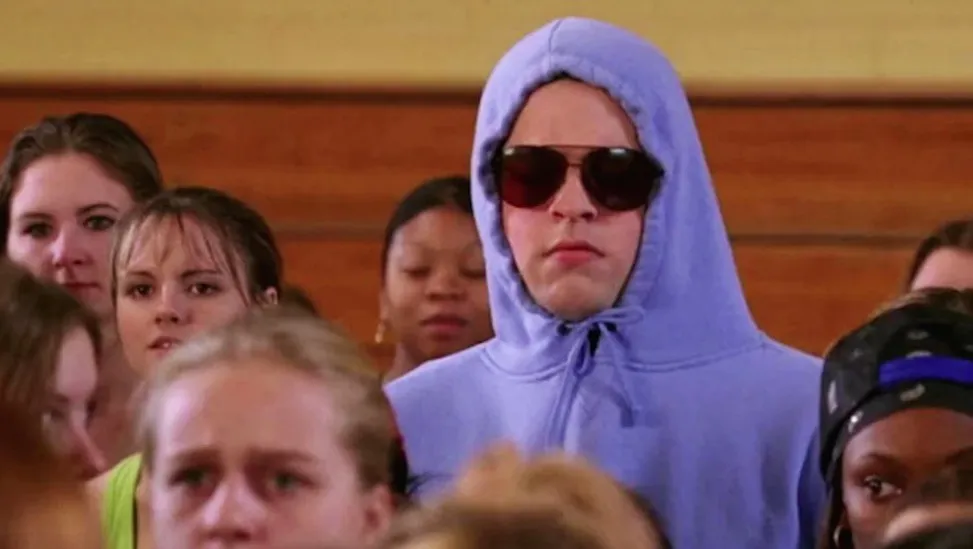How Mean Girls changed the lives of a generation of queer people: ‘A gay awakening’
Sign up for more LGBTQ+ news and updates at TrueQueer.
Twenty-two-year-old Drew Hudson, a resident of New Brunswick, Canada, first watched the pop culture phenomenon film Mean Girls when he was just six years old. Although he wasn’t supposed to watch it at such a young age, it quickly became his favorite movie. As he grew older, his obsession with Mean Girls only intensified. He proudly displayed his love for the film by wearing a nametag at work that stated Mean Girls was his favorite movie, using a still from the film as his computer background, and having a drawing of Amanda Seyfried’s character Karen as his phone lock screen.
Now, twenty years after its release, Mean Girls continues to be a significant presence in popular culture. The 2018 Broadway adaptation of the film received 12 Tony award nominations, and singer Ariana Grande even used Mean Girls as the inspiration for her “Thank U Next” music video. Quotes from the film are frequently recited, showing that its influence has not waned. Now, a film adaptation of the Broadway musical is being shown in cinemas.
For many queer individuals who entered high school in the mid-2000s, Mean Girls and its characters resonated deeply. It depicted outsiders fighting for survival and newcomers finding their tribe. One character, Damian, played by Daniel Franzese, was particularly influential for gay men. Drew explains that Damian was the first gay character he saw on screen who was explicitly identified as gay. While Drew initially had reservations about being typecast as Damian by his friends due to being in the closet at the time, he now embraces the character and sees himself in him.
Ian Wright, another fan of Mean Girls, discovered the film during his senior year of high school and became instantly obsessed with it. He quotes lines from the film frequently and relates to Damian as a gay, overweight, fierce, and fearless character. Damian’s scene at the talent show, where he sings Christina Aguilera’s “Beautiful” and throws a shoe back at a heckler, resonated deeply with Ian. He appreciates that Damian is unapologetically himself, breaking the mold of how queer characters were typically portrayed in films.
Daniel Franzese, the actor who played Damian, has received numerous messages from fans expressing how much the character meant to them. Growing up, Franzese noticed the lack of positive queer representation in the media. Damian’s ability to be himself without facing ridicule or discrimination was significant for many queer individuals. Franzese now understands the importance of representation and how his portrayal of Damian became a beacon of hope for many people.
While Damian had a profound impact on gay men, another character, Aaron Samuels, played by gay actor Jonathan Bennett, also played a role in queer awakenings. Aaron’s attractiveness and charm captivated many gay men, leading to a desire to either be him or be with him. Mean Girls also resonated with queer women. Lizzy Caplan’s character, Janis Ian, was claimed as a member of the LGBTQ+ community long before her sexuality was confirmed by writer Tina Fey. Additionally, many millennial lesbians found inspiration in Tina Fey’s character, Ms. Norbury. Maria, a Mean Girls superfan, even has a tattoo of Tina Fey. She saw Ms. Norbury as a motherly figure and appreciated her caring and protective nature.
Regina George, the head b***h in charge, also had a significant impact on queer individuals. Peter Fenton, a theatre and film writer, believes that Regina’s power and influence have captivated many queer people who historically have not had much power themselves. The idea of upending the status quo and watching it crumble resonates with the queer community. Drew finds Regina’s allure in her c**ty nature and compares her to Judy Garland, noting her untouchableness that is somehow connected to queerness.
The original Mean Girls film holds a special place in LGBTQ+ entertainment, serving as a formative piece for queer individuals. The 2024 musical film adaptation continues this legacy with a cast that includes established queer stars. Reneé Rapp, a queer actor, takes on the role of Regina George, while Jaquel Spivey, a queer Black actor, portrays Damian. Auliʻi Cravalho, a bisexual star, plays the character Janis. This increased representation aligns Mean Girls even more closely with the queer community.
In a time when queer people are facing increased backlash and discrimination, it is heartening to see a mainstream piece of pop culture embracing the LGBTQ+ community. Mean Girls has undoubtedly changed the lives of a generation of queer individuals, providing them with relatable characters and stories that helped them navigate their own journeys of self-discovery and acceptance.
Follow us on: Facebook for more LGBTQ+ news and updates at TrueQueer.
“Mean Girls queer representation”
![]()

